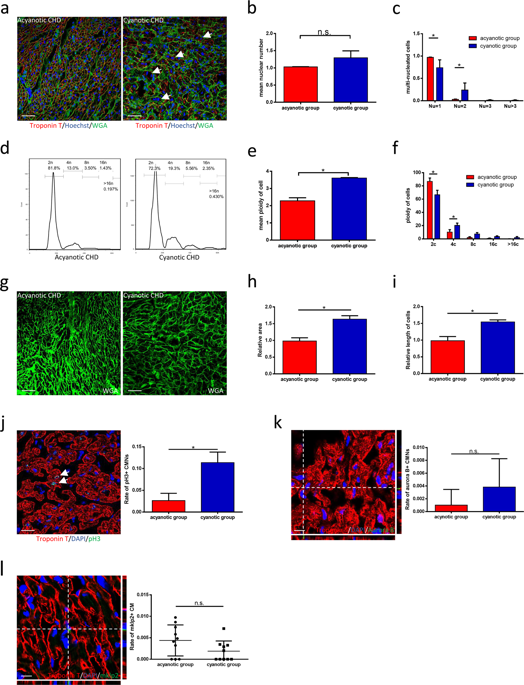Our official English website, www.x-mol.net, welcomes your
feedback! (Note: you will need to create a separate account there.)
Re-enforcing hypoxia-induced polyploid cardiomyocytes enter cytokinesis through activation of β-catenin.
Scientific Reports ( IF 3.8 ) Pub Date : 2019-11-28 , DOI: 10.1038/s41598-019-54334-4 Yun-Han Jiang 1 , Yu Zhu 1 , Sai Chen 1 , Hai-Long Wang 1 , Yang Zhou 2 , Fu-Qin Tang 1 , Zhao Jian 1 , Ying-Bin Xiao 1
Scientific Reports ( IF 3.8 ) Pub Date : 2019-11-28 , DOI: 10.1038/s41598-019-54334-4 Yun-Han Jiang 1 , Yu Zhu 1 , Sai Chen 1 , Hai-Long Wang 1 , Yang Zhou 2 , Fu-Qin Tang 1 , Zhao Jian 1 , Ying-Bin Xiao 1
Affiliation

|
Cardiomyocyte (CM) loss is a characteristic of various heart diseases, including ischaemic heart disease. Cardiac regeneration has been suggested as a promising strategy to address CM loss. Although many studies of regeneration have focused mainly on mononucleated or diploid CM, the limitations associated with the cytokinesis of polyploid and multinucleated CMs remain less well known. Here, we show that β-catenin, a key regulator in heart development, can increase cytokinesis in polyploid multinucleated CMs. The activation of β-catenin increases the expression of the cytokinesis-related factor epithelial cell transforming 2 (ECT2), which regulates the actomyosin ring and thus leads to the completion of cytokinesis in polyploid CMs. In addition, hypoxia can induce polyploid and multinucleated CMs by increasing factors related to the G1-S-anaphase of the cell cycle, but not those related to cytokinesis. Our study therefore reveals that the β-catenin can promote the cytokinesis of polyploid multinucleated CMs via upregulation of ECT2. These findings suggest a potential field of polyploid CM research that may be exploitable for cardiac regeneration therapy.
中文翻译:

增强缺氧诱导的多倍体心肌细胞通过激活β-catenin进入胞质分裂。
心肌细胞(CM)丢失是包括缺血性心脏病在内的各种心脏病的特征。心脏再生被认为是解决CM丢失的一种有前途的策略。尽管许多再生研究主要集中在单核或二倍体CM,但与多倍体和多核CM的胞质分裂相关的局限性仍然鲜为人知。在这里,我们显示β-catenin是心脏发育中的关键调节剂,可以增加多倍体多核CMs的胞质分裂。β-catenin的激活增加了胞质分裂相关因子上皮细胞转化2(ECT2)的表达,它调节放线菌素环,从而导致多倍体CM中胞质分裂的完成。此外,缺氧可通过增加与细胞周期G1-S后期有关的因素诱导多倍体和多核CM,但与胞质分裂无关的因素增加。因此,我们的研究表明,β-连环蛋白可以通过上调ECT2来促进多倍体多核CM的胞质分裂。这些发现暗示了多倍体CM研究的潜在领域,可用于心脏再生治疗。
更新日期:2019-11-29
中文翻译:

增强缺氧诱导的多倍体心肌细胞通过激活β-catenin进入胞质分裂。
心肌细胞(CM)丢失是包括缺血性心脏病在内的各种心脏病的特征。心脏再生被认为是解决CM丢失的一种有前途的策略。尽管许多再生研究主要集中在单核或二倍体CM,但与多倍体和多核CM的胞质分裂相关的局限性仍然鲜为人知。在这里,我们显示β-catenin是心脏发育中的关键调节剂,可以增加多倍体多核CMs的胞质分裂。β-catenin的激活增加了胞质分裂相关因子上皮细胞转化2(ECT2)的表达,它调节放线菌素环,从而导致多倍体CM中胞质分裂的完成。此外,缺氧可通过增加与细胞周期G1-S后期有关的因素诱导多倍体和多核CM,但与胞质分裂无关的因素增加。因此,我们的研究表明,β-连环蛋白可以通过上调ECT2来促进多倍体多核CM的胞质分裂。这些发现暗示了多倍体CM研究的潜在领域,可用于心脏再生治疗。




















































 京公网安备 11010802027423号
京公网安备 11010802027423号